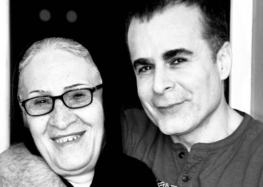Musician Ali Ghamsari Banned From Performing in Iran After Refusing to Remove Female Singer

“Our Sing-Along Didn’t Violate Any Rules”
After the Iranian authorities banned musician Ali Ghamsari from performing “until further notice” for refusing to remove a female singer from his most recent concert in Tehran, he announced on his Instagram page that he “wasn’t sorry at all.”
Iran has no specific laws barring women from singing in public but the action could be prosecuted as an act of immorality if the performance does not follow a set of arbitrary rules promoted by religious conservatives and enforced by hardline security agencies and judicial officials.
Ever since the country’s 1979 Islamic Revolution, the authorities have not permitted women soloists from performing in front of mixed-gender audiences. The policy has been strongly supported by conservative Shia religious leaders who believe such performances violate Islamic principles.
On January 8, Ghamsari wrote on Instagram that before his band’s January 7 performance in Tehran’s Vahdat Hall, an Islamic Guidance Ministry official had warned him “that if we went ahead with the performance, the sound would be cut off and as of tomorrow we would be banned from performing.”
The sound equipment in the concert hall was indeed turned off that night when female singer Haleh Seyifzadeh and two men began to sing in harmony, but the band continued to perform.
“We had been harassed and pressured a lot by the authorities on previous nights but we didn’t say anything back to them, although in my opinion our sing-along didn’t violate any rules,” Ghamsari added.
Women are allowed to perform as part of choruses in Iran so long as the female’s voice does not dominate over male voices.
Ghamsari added that he did not regret standing by the female singer and trying to continue the performance:
“Last night, I was calm and confident when I stepped onto the stage. Confident that I had not sold out on my convictions. All the harassments, reprimands, threats, cancellations, insults and mandates are over. A lot of my friends think I may have made a mistake last night. But I’m not sorry at all. Maybe the gravity of the situation hasn’t sunk in yet. In any case, I hope for better days ahead for Iranian art.”
On her own Instagram page, the female singer explained: “Last night [Islamic Guidance Ministry official Ali Akbar] Safipour had told security personnel that Ali [Ghamsari] would be banned if I performed my singing part. I wanted to be cut from the performance but Ali said we will all go on stage and he would take the responsibility for it.”
Added Seyfizadeh: “We went on stage, although it was very hard for me to sing under those circumstances because I could see Ali and [band member] Behnam [Abolghasem] were playing their instruments in a lower tone so that my voice could be heard.”
“I have no words to describe Ali Ghamsari’s courage and bravery,” she said.
Since 2013, when President Hassan Rouhani was voted into office promising a more open society, numerous musicians including Salar Aghili, Alireza Ghorbani and Sirvan Khosravi have seen their concerts canceled for featuring female performers.
All of the cancelled concerts had received licenses from the Ministry of Culture and Islamic Guidance, which is required for all public performances, but other authorities including police units have intervened and stopped the shows.
In a January 2018 interview with the Center for Human Rights in Iran (CHRI), Iranian female singer Sepideh Jandaghi spoke about the discriminatory state policies banning women in Iran from performing on stage except in rare circumstances, such as in front of all-female audiences in performances that would be extremely expensive to organize and advertise.
“Our activities are limited to cyberspace,” Jandaghi said. “We don’t have much of a presence in the real world. We do it for fun. We never get a chance to practice our art in a professional setting.”
In 2017, more than 500 members of Iran’s music industry called on President Rouhani to follow through on his 2017 election campaign promise to uphold citizens’ rights by preventing the cancellation of state-sanctioned concerts.
The same week Ghamsari’s performance was disrupted, prominent Iranian theater director and playwright Mohammad Rahmanian was charged with “propaganda against the state” based on a complaint by the Islamic Revolutionary Guard Corps (IRGC) for allegedly featuring a female soloist in his play.






